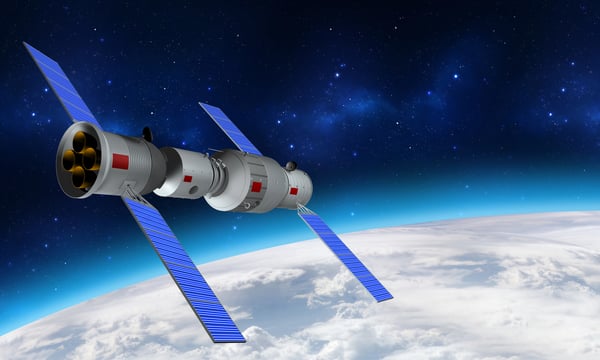In recent years, China’s outer space diplomacy and exploration has grown exponentially, especially as China readies itself to send its first human astronaut to the moon before 2030. However, beyond the moon, China has grown its space engagements, which now span all sectors ranging from governmental to commercial, and from satellites to a new space station.
But rather than just focusing on its own development and advancement of space, the Chinese government has struck agreements, memoranda of understanding, and partnerships with countries all across the world. China is not only pursuing space exploration, but also assessing a key role for itself in space diplomacy and coordination. This new direction in China’s space engagement was brought along by a combination of government strategies, a changing geopolitical environment, as well as scientific advancements that have evolved over the past decade.
In 2014, the Chinese government encouraged “private capital’s participation in China’s construction of civilian space infrastructure” as part of the Guiding Opinions of the State Council on Innovating the Investment and Financing Mechanisms in Key Areas and Encouraging Social Investment. Just two years later, China’s State Council released a white paper outlining key successes of China’s space program and pledging that for “the next five years and beyond China will uphold the concepts of innovative, balanced, green, open and shared development, and promote the comprehensive development of space science, space technology and space applications, so as to contribute more to both serving national development and improving the well-being of mankind.” In early 2022, China released its latest white paper on the topic, “China’s Space Program: A 2021 Perspective.”
China’s space program has seen multiple major milestones over the past two decades, with advancements rapidly increasing and with more ambitious targets set over the coming years – including sending a human to the moon by 2030.
The BeiDou Navigation Satellite System represents a decade-long priority by the Chinese government to develop its own navigation system independent of other systems such as GPS. Early-stage development in the 2000s initially focused on making this navigation system accessible to China, but by 2020, China hoped that BeiDou would be accessible and usable globally, with at least 30 satellites now in space.
In May 2021, China’s rover Zhurong successfully landed on Mars, with China becoming only the third country to achieve this feat following in the footsteps of the United States and the former Soviet Union. In 2019, China’s unmanned spacecraft Chang’e 4 was the first spacecraft to land on the far side of the moon. In 2024, Chang’e 6 successfully landed on the far side again and returned samples of soil to earth.
China has also built its own space station and is pursuing plans for a permanent research base on the moon. Tiangong, a space station with three modules, was officially completed in 2022 and is able to accommodate three astronauts for missions, with the first crewed mission already arriving before the station’s completion in 2021. In addition to its own space station, China’s National Space Administration (CNSA) – partnering with Russia’s State Corporation for Space Activities (Rocosmos) – announced plans in 2021 to unveil an International Lunar Research Station by 2035, with nearly a dozen other member countries, all from the Global South, having joined the initiative since its launch.
Beyond its own progress in the space sector, China is cranking up its diplomatic engagements and agreements on space with other countries. According to China’s Ministry of Foreign Affairs, China had “signed nearly 200 intergovernmental space cooperation agreements with over 50 countries and international organizations” as of April 2025, when China celebrated its tenth “space day.”
The success of China’s key space developments – such as the BeiDou system and the planned International Lunar Research Station – hinges not only upon their operation, but also on the infrastructure being utilized by other partners and countries.
In 2021, China and South Africa signed a memorandum of understanding to cooperate on satellite navigation, which would include “research and applications of BeiDou Navigation Satellite System (BDS) /GNSS in geophysics, space science, geodetic survey and other sectors based on GNSS data amongst other interest areas.” China also inked an agreement on BeiDou inked with Egypt. At the Shanghai Cooperation Organization (SCO) Summit in Tianjin this summer, China extended an invitation to use the BeiDou system to all the SCO member states.
For China’s ILRS project, CNSA shared that “17 countries and international organizations, as well as more than 50 international research institutions have joined” the initiative by April 2025. As part of the Forum on China-Africa Cooperation (FOCAC) summit in September 2024, Senegal became the most recent country to join the ILRS.
Going beyond the ILRS, Pakistan and China announced plans for a Pakistani astronaut to join Chinese astronauts on a mission to Tiangong, which has previously only been utilized by Chinese astronauts since its completion.
As China is ramping up its space exploration, Beijing’s space diplomacy activities will also grow in scale and reach. In its engagement, China is not going to limit itself to actively setting new milestones in space exploration. Rather, CNSA – and China’s space sector more broadly – is looking to become the world’s go-to provider of space infrastructure.
China’s space diplomacy is not only valuable in providing space technology and infrastructure, but also a soft power tool – providing a new or alternative systems to the U.S.-led space programs of the past. This comes at a time where the United States is also actively advancing its space capabilities, with NASA planning to return crewed missions to the moon as part of its Artemis III program by mid-2027.
In its space diplomacy, China seeks to especially engage countries it already partners closely with through organizations like the SCO, BRICS, or FOCAC. At these fora, new MoUs and agreements of cooperation on space are often inked. Some of these activities have also occurred under the umbrella of China’s Belt and Road Initiative (BRI), marking what some title a Space Silk Road in addition to China’s thematic and regional corridors of infrastructure and investment. In 2025 for example, China delivered a satellite to Laos, LAOSAT-1, to conduct its own operations, providing not only technology but also crucial financing for the project.
Looking to the future, Beijing is expected to continue its space exploration and diplomacy, as its strategic documents and projects indicate. China’s commercial sector may come to play a larger role in advancing space navigation and exploration, and seeking out partnerships with other companies, agencies, and countries. China’s Geely under Geespace is already launching satellites into space. Priority setting for new space projects and diplomacy may already be in the works for the next five years.






